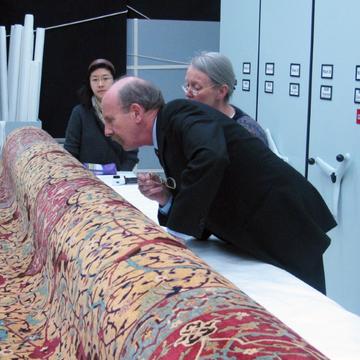Remembering Jon Thompson
Online May Beattie Lecture 2020

This event is organised by the May Beattie Archive, Department of Eastern Art, Ashmolean Museum,
and supported by the Humanities Cultural Programme, one of the founding stones for the
future Stephen A. Schwarzman Centre for the Humanities.
Watch event here:
https://www.youtube.com/embed/WdQPUYYaCio
The Director of the Ashmolean Museum, Dr Alexander Sturgis, and the Keeper of Eastern Art, Dr Mallica Kumbera Landrus, invite you to the Online May Beattie Lecture 2020
Remembering Jon Thompson
with Dr Francesca Leoni (Curator of Islamic Art, Ashmolean Museum), Professor Walter Denny (Distinguished Professor of Art History at the University of Massachusetts at Amherst), Dr Marika Sardar (Curator, Aga Khan Museum, Toronto) and Dr Hadi Maktabi (Independent Scholar and Rare Carpets Dealer).
This year’s May Beattie Lecture is a tribute to world-renowned carpet specialist Dr Jon Thompson, who passed away earlier this year. Through their own work and practice, four speakers will reflect on Jon Thompson’s achievements and legacy in the field of carpet studies and on the future of the area moving forward.
This event is sold out but you can watch the live stream event here: https://youtu.be/WdQPUYYaCio
Please register via Eventbrite.
Biographies:
Dr Francesca Leoni has been Curator of Islamic Art at the Ashmolean Museum since 2011, after holding curatorial, teaching and research positions at the Museum of Fine Arts, Houston, Rice University, the Metropolitan Museum of Art, Princeton University and Museum of Oriental Art, Rome. She is also Research Associate at the Khalili Research Centre for the study of Islamic art and material culture and a member of the Oriental Faculty, University of Oxford. Dr Leoni is a specialist in Persian art and particularly metalwork and works on paper. Her research has been supported, amongst others, by the Leverhulme Trust, the Art Fund, the Barakat Trust and the Foundation for Iranian Studies. She is the author of several books and articles, and the editor of a number of volumes spanning topics as diverse as Islamic mysticism, Persian illustrated manuscripts, Islamic esotericism, textiles, and eroticism in Islamic art. Amongst her forthcoming publications are Islamicate Occult Sciences in Theory and Practice, co-edited with Liana Saif, Matthew Melvin-Koushki and Farouk Yayha to be published by Brill later this year and the catalogue Aegean Legacies: Greek Island Embroideries from the Ashmolean Museum, with Hali Publishing, designed to accompany her latest exhibition, “Mediterranean Threads: 18th and 19th Century Greek Embroideries” (Ashmolean Museum, 12 September 2020-28 March 2021; https://www.ashmolean.org/event/mediterranean-threads).
Walter B. Denny is Distinguished Professor of Art History at the University of Massachusetts at Amherst, where he has taught since 1970, specializing in the art of the Islamic world. From 2007 to 2018 he served as Senior Consultant in the Department of Islamic Art at the Metropolitan Museum of Art. After undergraduate education at Robert College (Istanbul), Grinnell College and Oberlin College, and graduate studies at Harvard and at Istanbul Technical University, he completed his Ph.D. dissertation at Harvard in 1970. His research interests in Islamic art include architecture, design and painting, carpets, silk textiles, and ceramics. For over forty years he has also taught, pursued research, and published on the thousand-year history of east-west interchange in European artistic culture. He has served as a consultant for dozens of museums around the world, and his seminar in Museum Studies has prepared many University of Massachusetts graduate students for art museum careers.
Marika Sardar: Marika Sardar is Curator at the Aga Khan Museum, having previously worked at the Museum of Islamic Art in Doha, Qatar, the San Diego Museum of Art, and the Metropolitan Museum of Art. Major exhibitions include Interwoven Globe (2013), focusing on the worldwide textile trade from the 16th-18th century; Sultans of Deccan India, 1500-1750 (2015), examining the artistic traditions of the Muslim sultanates of central India; and Epic Tales from Ancient India (2016), looking at narrative traditions and the illustration of texts from South Asia. She is currently preparing, with John Seyller, a publication on the Mughal-era Persian-language manuscript of the Ramayana in the collection of the Museum of Islamic Art, Doha.
Hadi Maktabi: born into the 4th generation of the Middle East’s oldest dealership of Oriental & antique carpets, Hadi Maktabi initially specialised in Mathematics at Oxford University before completing his PhD in Islamic Art with a focus on Carpet Studies under the tutelage of the late Jon Thompson. He has been an advisor to a number of museums including the V&A, Louvre, the Carpet Museum of Iran and the Imam Reza Shrine Museum of Mashhad. He assisted the latter in investigating and cataloguing their substantial collections during which he discovered a hitherto unknown carpet signed by the elusive weaver Mohtasham and also rediscovered the famous Safavid silk garden carpet. A regular contributor to Hali and other academic journals, Hadi taught art history at the American University of Beirut for ten years before founding his own gallery for antique carpets & textiles in Beirut. His main focus is the period of 150 years linking (or separating?) the Safavid Age to the Revival era, which formed the topic of his doctoral thesis and subsequently was developed for his book The Persian Carpet: The Forgotten Years (2019).

Caption for image: Jon Thompson examining the Anhalt Medallion Carpet in 2010 in the Antonio Ratti Textile Centre, Metropolitan Museum of Art, New York. Photograph by Walter Denny


